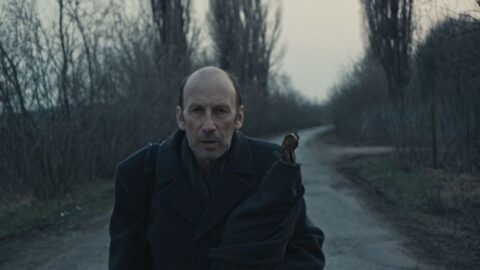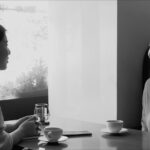A Marshrutka (share taxi) winds slowly through a dark landscape, covered in snow and mud, filled with quiet passengers. Our hero, Anatoliy (Oleksandr Maksiakov), a middle-aged, taciturn, balding man, gets out. But there’s a long way to walk yet. It feels like a long way for the audience too, Stepne (Maryna Vroda, 2023) taking its sweet time to tell what, at its essence, is a very simple story.
He’s here to care for his ailing mother (Nina Antonova), living alone in a small house in a forgotten Ukrainian village near the Russian border. In a telling early scene, he meets a friend “robbing” houses. He’s not so much taking dead people’s things, but holding on to them, in case their younger relatives come back. This is a place where nothing much happens, except old people dying. Including Anatoliy’s mother. Dealing with her funeral and selling her possessions, Stepne is a plodding reverie on the way the past has a long way of persisting — a film of repetitive movements, long walks, quiet conversations and silent glances.
For slow cinema, filled with intangibles, to work, directors should give us something to hold onto. It’s not just a question of duration — long, exhausting takes and repetitive motions — but also a question of aesthetics. With flat, medium-distance shots and muddy, unengaging digital images, Stepne might capture the bleakness and isolation of desolate villages, but it shies away from much of its beauty, or lost potential.
Yet for about twenty minutes in the middle, Stepne becomes alive with memory and nostalgia. Casting locals from the villages of the Sumy region, Stepne allows them to tell their stories, surviving Nazism, Sovietisation, famine, war and more, all the more relevant in the face of Ukraine’s current struggles against fascist invasion. Tales of ingenious cooking methods, friendships forged, family members lost: these scenes — shot in a muted, warm light, with a genuinely engaging use of heavy contrasts — contain Stepne’s beating heart, making it all the more frustrating when the story returns to a plodding, un-engaging mystery, shot in middle-range, moving incredibly slowly.
Finally ending on a scene of edgy cruelty that is not just mean, but unnecessary, obnoxious and nonsensical, Stepne purposefully removes any hope or joy from the equation; showing not the resilience of the land, but its inability to move on meaningfully from the past. There is a sense that the Kyiv-born Vroda is only telling half the story of this land and its people. It’s one thing to show how the Soviet era has cast a long shadow over Eastern Ukraine. It’s another to portray the region as entirely stuck inside it. I can’t say whether it’s true or not, but it makes for enervating viewing.
Redmond is the editor-in-chief of Journey Into Cinema.





